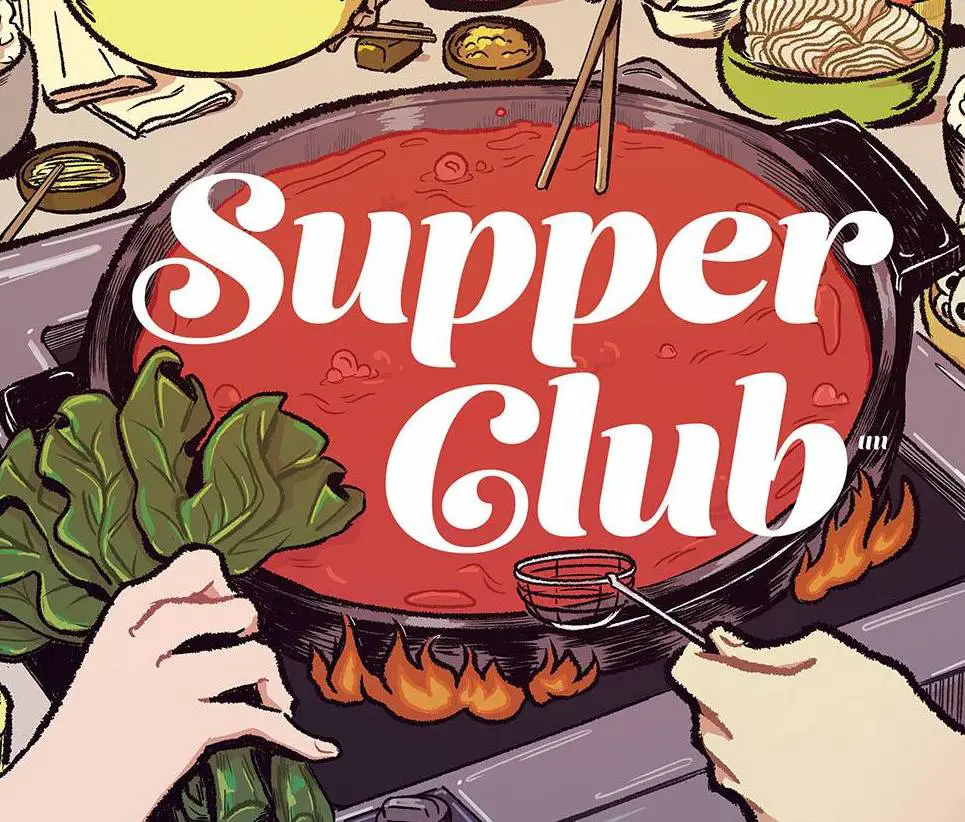Cooking is a topic that I’m endlessly interested in. It‘s an art, a fuel, a form of entertainment, a chore, a skill, a magic, and more. It is a reminder of family, culture, or community. For some, it is a reminder of all three. Food is life.
The weird thing to me, is how seldom the North American comic industry touches on cooking and food while eating is a part of our daily lives. Even while some writers (cough Bendis) set scenes during mealtimes, very seldom does a North American comic capture the magic of eating food, let alone cooking one. And while around 12 million Americans are employed in food service work, comics set in restaurants are few and far between. Food comics continue to be a rarity, for some reason.
It’s with all this baggage that Supper Club arrives next month, and it proves itself as both a cooking comic, and a coming of age one.
I am most impressed with how the ephemeral feeling of senior year dominates the book. There are main threads that are focused on, but the story spends a lot of time focusing on these little moments, these morsels of emotion, that really match the vibe of a school yearbook or a “senior year memories” slideshow that Google automated for you (but in a good way). The effect is oddly nostalgic, but in a warm kind of way. It doesn’t make me feel like I’m back in high school, but it does make me feel like I’m remembering high school; the tests, friends, punishments, and victories that consumed me. It doesn’t feel like it felt, but it does feel like how I remember it to be, warts and all.
Now, how does this relate back to food? In some ways, it doesn’t! The book doesn’t neatly follow some metaphor where one character is the top bun of a burger and another is the meat or whatever. For the most part, the titular Supper Club acts as a framing device, though it’s also a very smartly executed story engine. Still, there’s not an extremely obvious or clear metaphor to really point to – so of course, like all mediocre critics, I’ll fabricate one to make myself seem smarter than I am.
All of the choices in Supper Club make sense. The story is told chronologically, and there aren’t any confusing or unnecessary manipulations of structure. It’s all fairly straightforward, but for whatever seemingly intangible reason, it feels organic. The story unfolds in a way that feels almost naturalistic, like it’s obvious it was to be told in only this way. But of course, that isn’t how stories, or any works of art come into being.
The reality is, Jackie Morrow and Allie Pipitone made thousands of choices while making Supper Club, most of which I will likely never be privy to, including ones about the plot and structure. Oftentimes, especially in superhero comics, being overly structured and formal is something I get excited for when done well. It shows that great care was put into making sure the story was good, it provides a feeling of purpose behind the choices made. However, these techniques almost always draw attention to themselves, even when they make me happy.
With Supper Club, though, the opposite happens, where the narrative and art flow in such a way that is both easy to read and seamless where decisions are concerned. It feels like it was made by people who cared more about making a good story than they were concerned about showing how smart they are. In this roundabout way, it feels like a meal made by a friend. Made with care and love, first and foremost with you and your tastes in mind. That metaphor itself is imbued throughout the story, with food and friendship going hand-in-hand, to beautiful results.
Join the AIPT Patreon
Want to take our relationship to the next level? Become a patron today to gain access to exclusive perks, such as:
- ❌ Remove all ads on the website
- 💬 Join our Discord community, where we chat about the latest news and releases from everything we cover on AIPT
- 📗 Access to our monthly book club
- 📦 Get a physical trade paperback shipped to you every month
- 💥 And more!













